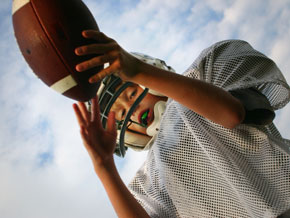Should You Let Your Kids Play Football?

Photo: © 2009 Jupiterimages Corporation
Football is one of the most popular sports in America, with an estimated one in eight boys in America playing. As with any physical activity, there is a risk of injury—pulled muscles, twisted ankles and even broken bones. But football is unique in that it adds a risk of a class of injuries that other sports do not: brain injuries.
A study by Nationwide Children's Hospital in Columbus, Ohio, and Ohio State University found that of the roughly 400,000 concussions that occurred in high school sports in the 2008–2009 school year, most were suffered by football players.
A concussion is usually caused by a significant blow to the head, resulting in loss of consciousness, confusion, severe headache or memory loss of the incident that caused the concussion. While people have long recognized that concussions can be serious injuries, just a few years ago it was not uncommon for a football player to return to a game after suffering one.
One group raising awareness of how dangerous this can be is the Sports Legacy Institute, a research and education organization co-founded by brain injury expert Dr. Robert Cantu and Chris Nowinski, a former Harvard football player and professional wrestler who was forced to retire after suffering six concussions in four years. His last two concussions were just weeks apart. "Both involved blackouts in the ring where I forgot who was supposed to win the match once I came to," he says. "At that time, in 2003, concussions weren't discussed. Doctors didn't understand them either. It wasn't until I met Dr. Cantu that even I, at 24 and a Harvard grad, even understood that there are long-term consequences from head injuries."
Those long-term consequences can include physical debilitation, depression, reduced intellectual function and even death.
Due to the work of groups like the Sports Legacy Institute, understanding of the dangers of concussions has grown significantly in recent years, and doctors are more aware of how to treat someone who has suffered one. "You help concussions recover more quickly and, theoretically, you reduce long-term damage by letting your brain rest after a concussion. It's both physical rest and cognitive rest," Nowinski says. "The idea is that you don't tax your brain for a few days. Sometimes kids stay home from school, you don't play video games, you don't go take the SAT for fun."
Recent laws in Washington, Oregon and Texas also strive to make football less dangerous. The Washington law, for instance, requires a doctor's note affirming that a player who has suffered a concussion is healthy enough to return to the field. However, there is still a wide gap in the safety net for young athletes and brain injuries—the education of adults. "The idea that the coach has never been trained on an injury that half of the kids will get and could kill them if they're back too soon, it's starting to look crazier and crazier," Nowinski says. "We don't educate coaches, we don't educate kids and we don't educate parents about brain injury in contact sports."
A study by Nationwide Children's Hospital in Columbus, Ohio, and Ohio State University found that of the roughly 400,000 concussions that occurred in high school sports in the 2008–2009 school year, most were suffered by football players.
A concussion is usually caused by a significant blow to the head, resulting in loss of consciousness, confusion, severe headache or memory loss of the incident that caused the concussion. While people have long recognized that concussions can be serious injuries, just a few years ago it was not uncommon for a football player to return to a game after suffering one.
One group raising awareness of how dangerous this can be is the Sports Legacy Institute, a research and education organization co-founded by brain injury expert Dr. Robert Cantu and Chris Nowinski, a former Harvard football player and professional wrestler who was forced to retire after suffering six concussions in four years. His last two concussions were just weeks apart. "Both involved blackouts in the ring where I forgot who was supposed to win the match once I came to," he says. "At that time, in 2003, concussions weren't discussed. Doctors didn't understand them either. It wasn't until I met Dr. Cantu that even I, at 24 and a Harvard grad, even understood that there are long-term consequences from head injuries."
Those long-term consequences can include physical debilitation, depression, reduced intellectual function and even death.
Due to the work of groups like the Sports Legacy Institute, understanding of the dangers of concussions has grown significantly in recent years, and doctors are more aware of how to treat someone who has suffered one. "You help concussions recover more quickly and, theoretically, you reduce long-term damage by letting your brain rest after a concussion. It's both physical rest and cognitive rest," Nowinski says. "The idea is that you don't tax your brain for a few days. Sometimes kids stay home from school, you don't play video games, you don't go take the SAT for fun."
Recent laws in Washington, Oregon and Texas also strive to make football less dangerous. The Washington law, for instance, requires a doctor's note affirming that a player who has suffered a concussion is healthy enough to return to the field. However, there is still a wide gap in the safety net for young athletes and brain injuries—the education of adults. "The idea that the coach has never been trained on an injury that half of the kids will get and could kill them if they're back too soon, it's starting to look crazier and crazier," Nowinski says. "We don't educate coaches, we don't educate kids and we don't educate parents about brain injury in contact sports."



